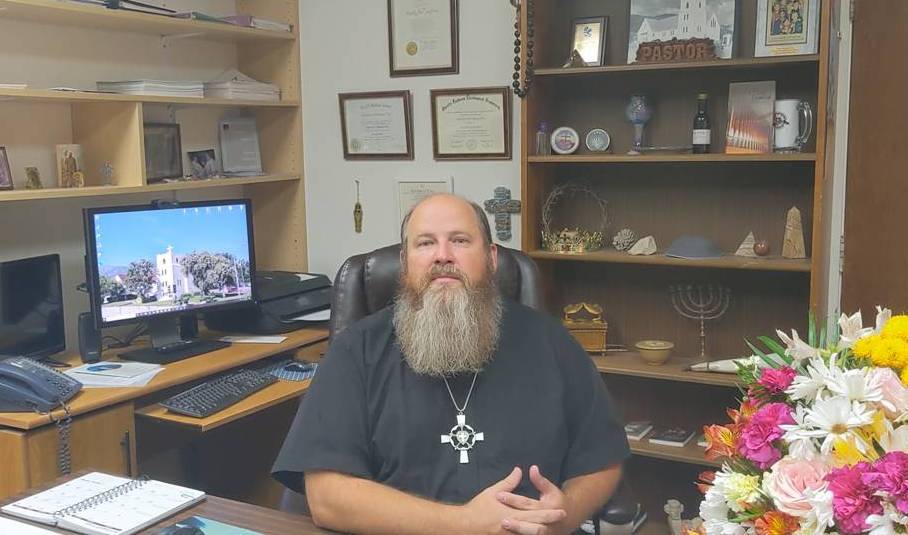I recently read the Epistle of First Peter, and the words “Baptism now saves you” really stood out to me (see 1 Peter 3:18-22). As a result, I’ve been thinking a lot recently about our commission and ministry from our Lord Jesus Christ to “Go and make disciples of all nations, baptizing them in the name of the Father and of the Son and of the Holy Spirit” (Matthew 28:18-20). And of course, our baptizing ministry to and for all peoples and nations is preferably done within the assembly of worship.
In worship, Christ is encountered. In the liturgy, Christ is present and self-giving, and he is ever-addressing his people. By the grace and power of the Holy Spirit, the Son of God is active and present through his Word and Sacraments. Consequently, a blessed assurance and confidence runs high within Lutheranism concerning the purpose of gospel proclamation and liturgical worship. In particular, according to the Word of God, Christ and his salvation are reliably encountered in Holy Baptism, in Holy Communion, and in the Holy Scriptures.
In the Old Testament, Psalm 105:1-6 declares the following… “O give thanks to the Lord, call on his name, make known his deeds among the peoples. Sing to him, sing praises to him; tell of all his wonderful works. Glory in his holy name; let the hearts of those who seek the Lord rejoice. Seek the Lord and his strength; seek his presence continually. Remember the wonderful works he has done, his miracles, and the judgments he has uttered, O offspring of his servant Abraham, children of Jacob, his chosen ones.”
In this biblical song of praise, the “deeds” that are to be made known to the “peoples” (i.e., the unbelieving Gentile nations) are referring to the deeds of God in and through his Covenant with Abraham, Isaac and Jacob. God’s great covenantal acts are to be made known to the nations, to both believers and unbelievers, through our shared liturgical life by “singing” and “praising” and “telling” and “remembering” God’s deeds of creation and salvation. And the purpose of such liturgical worship by the People of Israel was not merely for historical remembrance but for an encounter with the Lord God himself.
All of this is only intensified in the New Covenant. Our Lord Jesus performs his words, deeds, miracles and judgments in and through the worshiping assembly of his Church. In fact, Martin Luther comments on Psalm 105 by saying there are two things that belong to the true Christian believer: [1] The true believer has an illumined recognition of the Lord’s words and deeds (they have ears to hear and eyes to see the spiritual reality of things), and [2] The true believer has God-given affections for the Lord Jesus who is powerfully present in his Word and Sacraments. Therefore, liturgical worship is not merely a ‘style of worship’ but a whole theology of worship. Unbelievers hear the good news, and believers are conformed to the likeness of the Lord God whom they worship. In the liturgical assembly, Christ is present both to make disciples and to deepen discipleship. And it’s been said that the most solid and unwavering means of God-inspired, liturgical and missional activity comes by way of the Covenant of Holy Baptism.
In the great and global story of Christianity throughout the ages, neither door-to-door canvassing, nor tent revivals, nor even having stadium crusades have been the greatest vehicle of Christian evangelization. In every age of the Church of Jesus Christ, it’s Holy Baptism — particularly infant baptism — that has been the overwhelmingly greatest means of increasing, growing and expanding the Church globally. Since ancient days, Christians have babies and then bring those babies to Christ (in faith) to receive Christ’s saving Covenant of Holy Baptism, so that those infant children might one day grow to accept and affirm God’s baptismal grace and salvation for themselves by faith.
Through baptizing adults and children and infants alike, the Lord Jesus has built into the New Covenant of Holy Baptism an evangelistic feature that ensures the propagation of faith and salvation in which the Lord himself does all the saving work and receives all the glory. So, if we desire to see growth for congregations of the Church in our land, then every single one of us (both pastors and parishioners) would do well to ask people if they or their children have been baptized. And with this one simple evangelistic question, we will find that a great deal of gospel discussions will follow. In addition, we need to especially encourage married couples to bring their children to the waters of Holy Baptism.
A grace-filled theology and practice of Holy Baptism keeps the Church evangelistic and mission minded. Baptism is a mighty deed of the Lord, a miraculous act, and an absolving judgment — giving us much about which to praise and adore him. God’s grace in Christ alone fills our mouths with true praise, and our worship liturgy gives us the Bible-based words to do so. Furthermore, the evangelism of Holy Baptism is especially powerful when it takes place during our Sunday morning worship service, and it’s been too long (way too long) since the Sacrament of Holy Baptism has been administered at Mt. Olive.
I have to say that a lot of my best evangelistic moments have started with asking either of these simple questions: “Are you baptized?” and “Has your child been baptized?” So let us all commit to asking these simple evangelistic questions among the people of our relational circles more often. And let us always pray to God for guidance concerning who and when to ask these questions.
Together in Christ’s Mission, Pastor Tim

